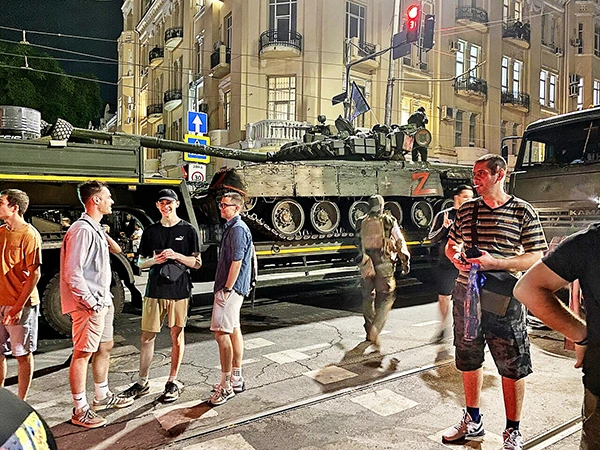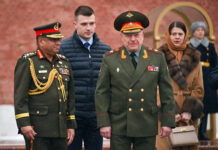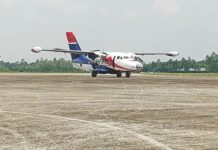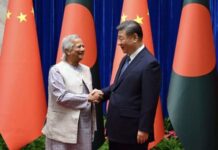Wagner Group and Private Military Companies
Maj Gen Deepak K Mehta
The possible reasons for Yevgeny Prigozhin and his Wagner Group to revolt against Russian President Vladimir Putin are still unclear, but there are a few possible explanations.
Prigozhin was unhappy with the way the Russian military was treating his Wagner Group mercenaries. Wagner Group is a private military contractor that has been used by the Russian government in a number of conflicts, including in Ukraine and Syria. Prigozhin had claimed that the Russian military had deliberately shelled Wagner Group positions, and that this has led to the deaths of many of his men.
Prigozhin may have been trying to position himself as a potential successor to Putin. Putin is 70 years old, and there was speculation that he may not run for re-election in 2024. Prigozhin was a wealthy and powerful businessman, and he may have been hoping to use the Wagner Group revolt as a way to boost his own political profile.
The revolt may have been a deliberate provocation by Putin himself. Putin has a history of using staged events to test the loyalty of his subordinates. It is possible that the Wagner Group revolt was a way for Putin to see how Prigozhin would react, and to test the loyalty of the Russian military.
Whatever the reasons for the revolt, it is clear that it was a serious challenge to Putin’s authority. The fact that Prigozhin was able to raise an army of thousands of men and march on Moscow is a sign that Putin’s grip on power is not as strong as it once was.
It is also worth noting that the Wagner Group revolt came at a time when Putin was facing increasing international pressure over the war in Ukraine. The revolt may have been a way for Prigozhin to distract from the war and to show Putin’s opponents that he was still a force to be reckoned with.
Ultimately, the reasons for Prigozhin’s revolt against Putin may never be fully known. However, the event is a reminder that even the most powerful leaders are not immune to challenges from their subordinates.
Implications of Revolt
Here are some of the implications of the Wagner Group revolt:
The revolt damaged the reputation of the Wagner Group. The group is now seen as a more dangerous and unpredictable organization, and it is likely to have difficulty securing contracts in the future.
The revolt weakened the position of Yevgeny Prigozhin. Prigozhin was the founder and leader of the Wagner Group, and the revolt showed that he was not in complete control of the organization.
The revolt increased tensions between Russia and Belarus. The Wagner Group is a Russian-backed mercenary group, and the revolt has strained relations between Russia and Belarus.
The revolt raised questions about the stability of the Russian government. The revolt showed that there is some dissent within the Russian government, and it is possible that this could lead to further instability in the future.
It is still too early to say what the long-term implications of the Wagner Group revolt will be. However, it is clear that this event has had a significant impact on Russian politics and on the Wagner Group itself.
Theories About Conspiracies
There are a few theories behind the notion that Prigozhin’s revolt may have been deliberately provoked by Putin.
Putin wanted to test the loyalty of the Russian military. The Russian military is a powerful institution, and Putin has been careful to cultivate its loyalty. The Wagner Group revolt was a way for Putin to see how the military would react to a challenge to his authority.
Putin wanted to eliminate a potential rival. Prigozhin was a wealthy and powerful businessman, and he has been seen as a potential successor to Putin. The Wagner Group revolt was a way for Putin to remove Prigozhin from the political scene.
Putin wanted to distract from the war in Ukraine. The war in Ukraine has been a major source of international criticism for Putin. The Wagner Group revolt was a way for Putin to distract from the war and to show his opponents that he was still a force to be reckoned with.
It is important to note that these were just theories, and there was no concrete evidence to support any of them. However, the fact that Putin has a history of using staged events to test the loyalty of his subordinates, and the fact that the Wagner Group revolt came at a time when Putin was facing increasing international pressure, suggests that it is possible that the revolt was deliberately provoked by Putin.
Wagner Group Strength
The Wagner Group is a shadowy organization that is closely linked to the Russian government, but its exact size and structure are unknown. It is believed to be made up of former Russian military personnel, as well as mercenaries from other countries.
The Wagner Group is a Russian private military contractor (PMC) that has been active in a number of conflicts, including in Ukraine. The group was controlled by Yevgeny Prigozhin, a close ally of Russian President Vladimir Putin.
The Group’s organization is hierarchical, with a clear chain of command. The group is divided into brigades, which are further divided into companies and platoons. Each brigade is led by a commander, who reports to a higher-level commander.
The Group’s strength is estimated to be between 20,000 and 50,000 fighters. The group’s fighters are mostly former Russian military personnel, but they also include mercenaries from other countries. The group’s fighters are well-trained and equipped, and they are often used in the most dangerous and difficult missions.
The Group’s weapons are a mix of Russian and Western-made weapons. The group is known to use assault rifles, machine guns, sniper rifles, rocket-propelled grenades, and anti-tank missiles. The group also has access to armored vehicles, including tanks and armored personnel carriers.
The Group has been active in Ukraine since the beginning of the Russian invasion in 2022. The group has been involved in a number of key battles, including the Battle of Kyiv and the Battle of Mariupol. The group has also been accused of committing war crimes in Ukraine.
The Group is a significant force in the Russian invasion of Ukraine. The group’s fighters are well-trained and equipped, and they have been involved in some of the most important battles of the war. The group’s involvement in the war has also raised concerns about the use of PMCs in conflicts.
Employment of Wagner Group in Ukraine
The Wagner Group has been involved in a number of fronts in Ukraine, but they have been most active in the Donbas region. The Donbas is a strategic region in eastern Ukraine, and it has been the focus of heavy fighting since the beginning of the war. The Wagner Group has been used to support Russian forces in the Donbas, and they have been involved in some of the most intense battles in the region.
The Group has also been active in other parts of Ukraine, including the southern coast and the capital, Kyiv. However, their involvement in these areas has been less significant than their involvement in the Donbas.
Here are some of the specific battles that the Wagner Group has been involved in:
The Battle of Debaltseve (2015)
The Battle of Mariupol (2022)
The Battle of Severodonetsk (2022)
The Battle of Lysychansk (2022)
The Wagner Group has also been accused of committing war crimes in Ukraine. In 2022, the United States imposed sanctions on the Wagner Group and its leader, Yevgeny Prigozhin, for their involvement in war crimes in Ukraine.
Sanctuary by Belarus
There are a few reasons why Belarus gave sanctuary to Yevgeny Prigozhin and the Wagner Group.
Geopolitical considerations. Belarus is a close ally of Russia, and the Wagner Group is a Russian-backed mercenary group. By giving sanctuary to the Wagner Group, Belarus is currying favor with the Kremlin. This could be seen as a way for Belarus to secure its own interests in the face of Western sanctions and pressure.
Economic considerations. The Wagner Group is a lucrative business, and Belarus may be hoping to profit from its presence in the country. The Wagner Group has been involved in a number of high-profile contracts in Africa, and it is possible that Belarus could be hoping to attract similar contracts.
Security considerations. The Wagner Group is a well-trained and well-equipped mercenary group. By giving sanctuary to the Wagner Group, Belarus is gaining a valuable asset in terms of security. The Wagner Group could be used to protect Belarus’s borders or to suppress dissent within the country.
It is also possible that there are other, less obvious reasons why Belarus has given sanctuary to the Wagner Group.
Revolt Difused
The Wagner Group revolt was diffused by a combination of factors, including:
Belarusian Intervention. President Alexander Lukashenko, who is a close ally of Russian President Vladimir Putin, brokered a deal between Prigozhin and the Kremlin that allowed the Wagner Group to withdraw from Moscow without further violence.
The threat of military force. The Russian military was mobilized to stop the Wagner Group’s advance on Moscow, and it is likely that this threat played a role in persuading Prigozhin to back down.
Lack of popular support . The Wagner Group is not a popular organization in Russia, and it is likely that the Kremlin was concerned about the potential for widespread unrest if the revolt had continued.
In the end, the Wagner Group revolt was a failure. The group was unable to achieve its goals, and it was forced to withdraw from Moscow without further violence.
Despite the Russian government’s denials, the use of the Wagner Group by the Russian government has been controversial. Critics have accused the group of committing war crimes and human rights abuses, and of destabilizing countries in which it operates.
==
Wagner Group Worldwide
The Wagner Group has been used by Russia in a number of countries around the world, including:
Ukraine: The Wagner Group has been heavily involved in the conflict in Ukraine since 2014, and is believed to have played a significant role in the capture of Crimea and the Donbas region.
Syria: The Wagner Group was deployed to Syria in 2015 to support the Assad regime, and has been accused of committing war crimes, including the use of chemical weapons.
Libya: The Wagner Group was deployed to Libya in 2019 to support Khalifa Haftar, and has been accused of human rights abuses.
Mozambique: The Wagner Group was deployed to Mozambique in 2019 to fight against Islamic State militants, and has been accused of committing abuses against civilians.
Central African Republic: The Wagner Group has been active in the Central African Republic since 2018, and is believed to have been involved in the looting of natural resources.
In addition to these countries, the Wagner Group has also been reported to be active in Sudan, Madagascar, and Guinea.


















